24th January 2024
There were 18 gamers this session playing a wide variety of games, many new to the club.
Starter games this session were Cryptid, Patchwork Doodle and Splendor.
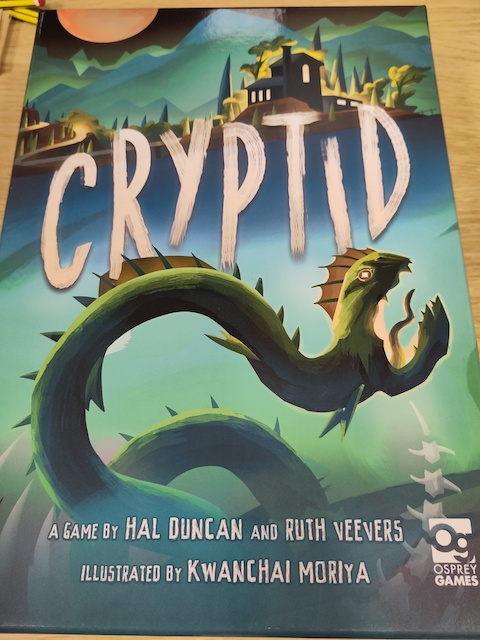
In Cryptid a group of like-minded cryptozoologists have come together to finally uncover the elusive Cryptid creature - last played in the session 36. This is a competitive puzzle game where each player has a different piece of evidence to locate the creature on the modular map which allows much replay and difficulty scaling.
On a players turn you get to choose a location on the board and fish for more information or hunt for the creature. If you ask for more info, you choose another player and they have to indicate if the creature could be found there, placing a cylinder for yes, or a cube for no. If no, you also have to reveal a location the creature could not be found. On hunting you have to put a cylinder on the location (as it has to be a valid place your information says it could be found), and then each other player in turn adds to the information but it stops when a player puts a cube for no. If all players place a cylinder - you’ve won and found the elusive creature. Its an intriguing game of deducing what the others players know from the responses they place on the board. The game is quite short, but its a head scratcher as your theories can get overturned with each piece put down. In the end Neil O. managed to locate the creature with Jeremy J. just missing out by one location!
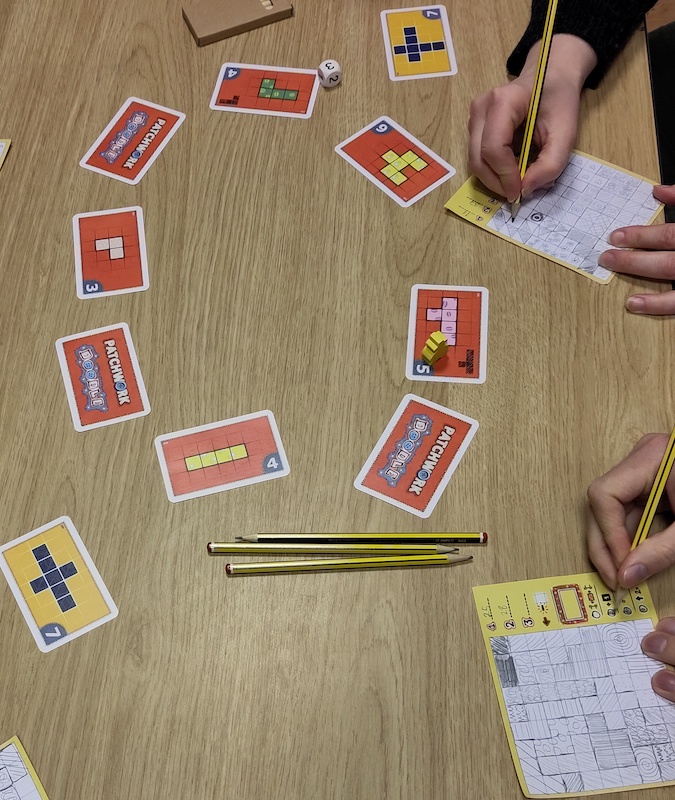
Patchwork Doodle is a simple “roll and draw” game, the aim is to use the randomly selected tetris like pieces best to fill your board up before the end of the third round and final scoring. On its seventh play at club this game has space for six players and is quick to explain and a good ice breaker at the start of a session.
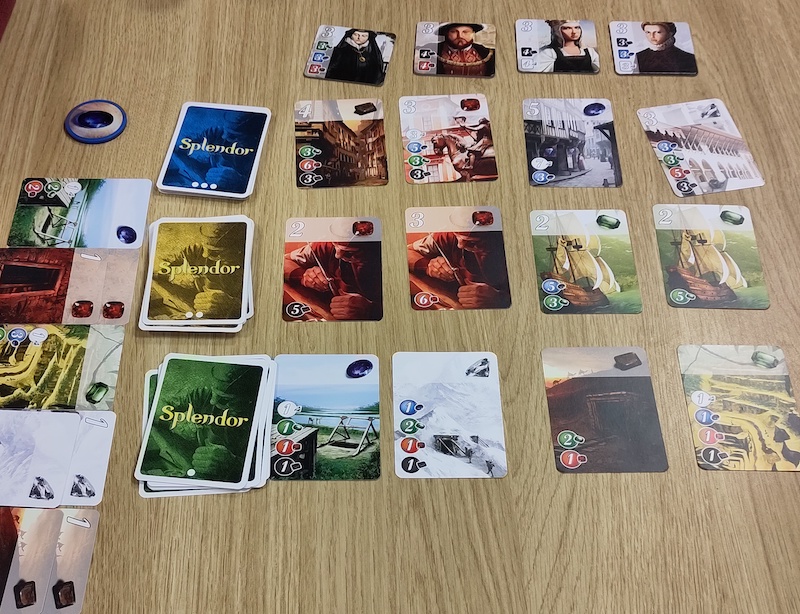
Splendor is quite an classic game released in 2014 and one we sometimes play on club BGA nights (not in person with chat over a Discord channel) but this was its first time with the physical copy at club. It is a gem collecting and engine building game to buy cards worth prestige points and the first to 15 is the winner. There are five types of gems and the cheaper cards you can buy with them then provide a bonus permanent gem of a certain colour in your collection. The more expensive cards cost more gems but bring either more permanent gem bonuses or prestige points. Finally there are a few noble cards which are randomised each game which cost a lot of gems but bring in a lot of prestige. So all the players are trying to build an engine with the cheaper cards to build up to the gems required to acquire the nobles first. The mechanism limits how many gems you can hoard so you have to start buying the cheaper cards to accumulate the permanent gem bonuses and this keeps the pool of available gems changing and prevents any colour being blocked for too long. The rules are fairly simple to explain and with four players tends to take 30 minutes to play.
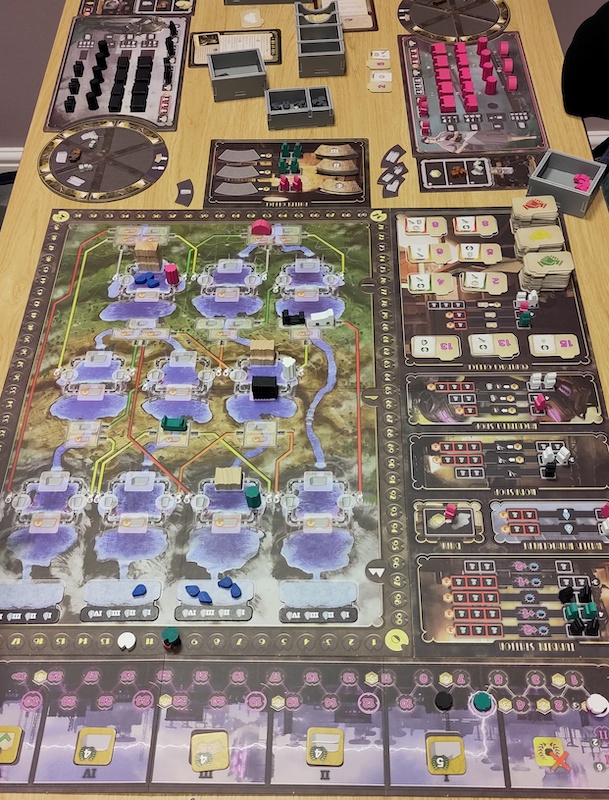
A game of Barrage had been pitched in advance on Discord and the final seat was quickly filled, as this is a long one they got going as quickly as possible after Steve L. set up all the components and explained the rules. This was the first of the water themed games of the night in this game about hydroelectric power.
Barrage made its first official appearance at the club, although it has featured regularly in off- grid games and developed a small cult following among those in the know. The theme is hydro- electric power generation in a stylised post WW1 Alpine setting with local powers Germany, Italy, France and, err, the USA competing to build dams and connect them to power stations via conduits. The game combines worker placement, area control, engine building and contract fulfilment in an elegant (and highly addictive) design. Each nation has its own benefits, which mainly come from income and production bonuses as structures are built off the player’s board (think Gaia Project). The central dynamic is the flow of water downhill from mountains to hills and then the plains, with dams in higher regions being more productive but also more costly to build. And building high allows water to be diverted from its natural course, which may well frustrate those who have constructed lower down. More of that later.
Host Steve L. won the lottery for first pick and chose Germany. He was followed by new player Jason (Italy) and Barrage veterans Iker P. (France) and Jyo K. (USA). Inspired, tactically astute and masterful are all words that could be used to describe the host’s play. Sadly, woeful, abject and dismal would be more accurate though. Things started brightly enough with Germany winning a tussle with France over a mid-level site and success there allowed Germany to build an early lead, forcing France to change its plans. Meanwhile, the USA was quietly building enormous pink dams at the bottom of the board, which most water will eventually reach, and Italy was concentrating its efforts on the less congested side of the board. Unfortunately for the host, newcomer Italy picked up the strategy a bit too quickly, and an Italian dam in the mountain region saw Germany deprived of its water source by mid-game. As Germany’s engineers stared mournfully at the empty basin in front of their prized dam, now drier than a cheap croissant, they faced two choices: end it all or make their own water. They opted for the latter course but lost a couple of rounds’ worth of production as they changed tack.
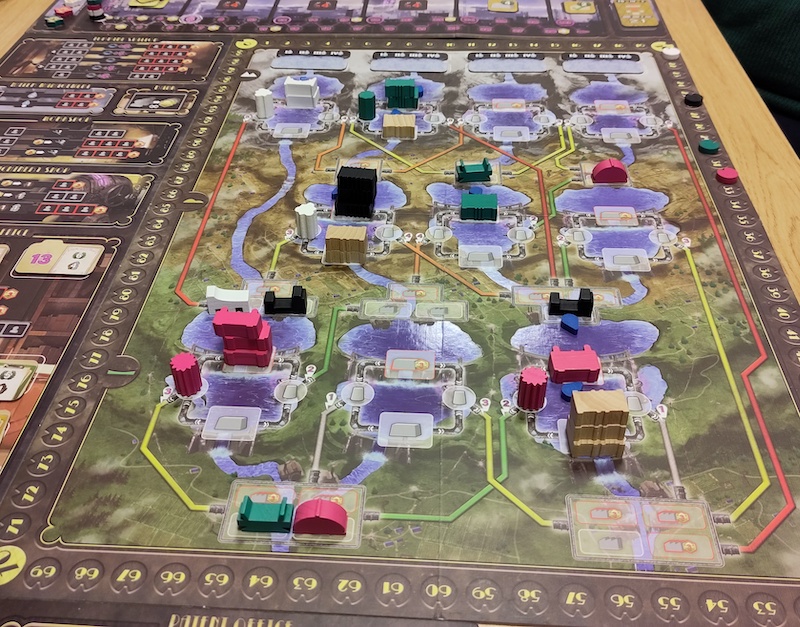
By this time, France was well on its way to re-tooling to take advantage of its ability to build high value conduits more cheaply than the competition and water was steadily accumulating in front of the giant Barbie-themed dams, driving regular production and giving the USA a commanding lead. France’s strategy came together spectacularly in the final round, allowing it to close the gap on the USA, but Germany languished in last place as its ‘make your own water’ policy delivered too little, too late. With a close finish in prospect at both the top and the bottom, final placings would be determined by end-game bonuses. These are randomised in set-up, and this time rewarded the players with infrastructure built in the most water basins. As these were counted up, France, the USA and Germany had five basins each and shared 15 points between them. However, Italy had managed to stay mainly off the radar and had stealthily built a presence in six basins, garnering 15 points, which was easily enough to consign the host to last place. When the dust settled at the other end of the scoreboard, it revealed a dead heat between France and the USA, leaving all-important domestic bragging rights in the balance. By then, it was too late in the day to look up the never before used tie breaker rule and this task was left to the host to do post pack-up. Duly done, the winner was found to be Iker.
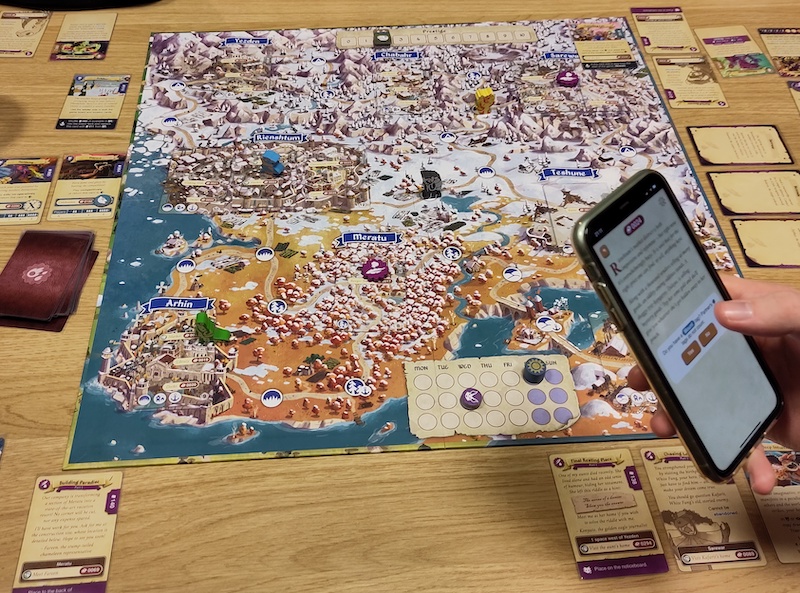
Kathy J. also had no problems filling seats in the adventure game Lands of Galzyr. As the rules are pretty basic and mostly driven by text from an app the four players were soon taking on the introductory quests for their characters; Keridai the newt scholar, Aysala the streetwise kingfisher, Mor the boastful frilled lizard and Bumir the adventuring polecat.
The players travelled between the nine main locations on the game board (from mountains to plains via forests and cities and across some bridges), occasionally meeting up in the same place and able to take part in each others quests. Over the course of five game days they helped build a holiday village, design a maze for a funfair, rescue children from an avalanche, intimidate three crocodile rogues, rescue an adorable kitten from a tree, completely fail to help a pelican fisherman untangle their nets and much more. Each day the player takes on one quest which leads to short story sections being read by another player from the app and then a couple of choices of which skill to use to resolve the problems presented.
Players start with some skill marks which provide some better dice to use in certain skill checks and acquire equipment and even companions on their journeys that can also provide extra bonuses in these skill checks, the triple barrelled pistol was certainly very helpful to intimidate the crocodiles. The game can be saved so players can pick up their quests next session and continue to resolve their characters initial quest series or just explore the map picking up other quests and even changing the map permanently with their actions, like the addition of the holiday village in the woods now available for all to visit in the future.
The game is light in tone with very varied quests and a good balance of choices so you are not always pushed towards combat. The players tried to get into character and liven up the encounters with some improv and were rooting for in other in the dice rolls so it was a fun nights adventure.
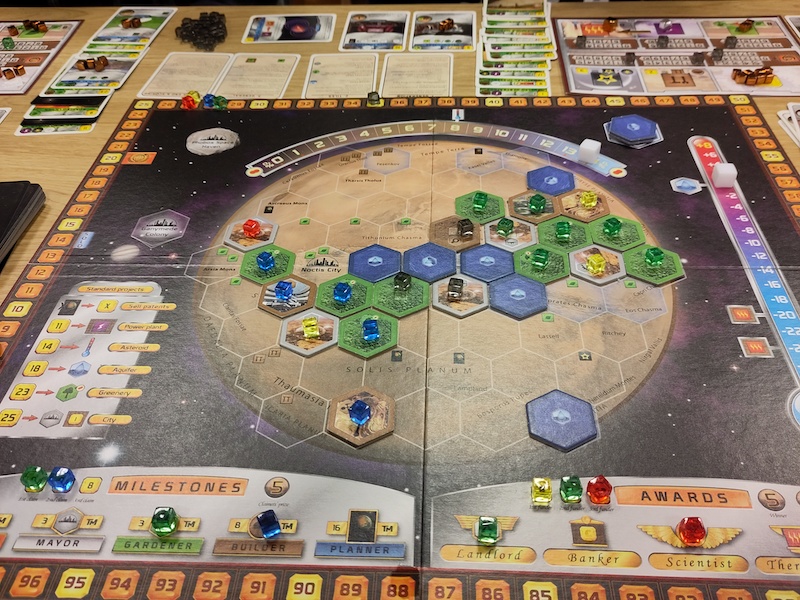
The next table chose returning favourite Terraforming Mars with its seventh club play, see the blog for session 5 which has a good gameplay description. The main aims of the game are to change the temperature, oxygen levels, plant or ocean coverage of Mars making it the second water themed game of the night.
The 5 players adopted different strategies, targeting different aspects of the game. Graham W.’s corporation gave heat which he used to increase temperature, and then money later in the game. Others used mining (steel, titanium) or the greening of the planet which caused some early differences in the game. In the end scores were all close, with a winning margin of a single point going to Graham.
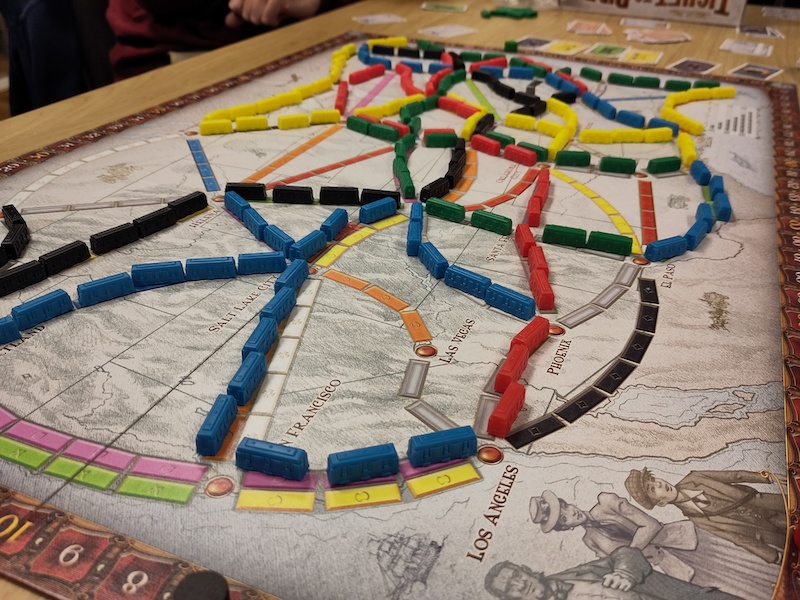
The final table started with classic Ticket to Ride then switched to card game Venture to finish the night.
This session of Ticket to Ride was a heated game to become rail baron of USA, with Simon W., Dave B., Jeremy J., James T. and Darren C. furiously building routes until Dave put down the last section that invoked the final round. After route scoring from tickets it was Dave B. who was winning, but a longest route count between Simon (30), James (31) and Jeremy (32) - put Jeremy in the lead and a win!
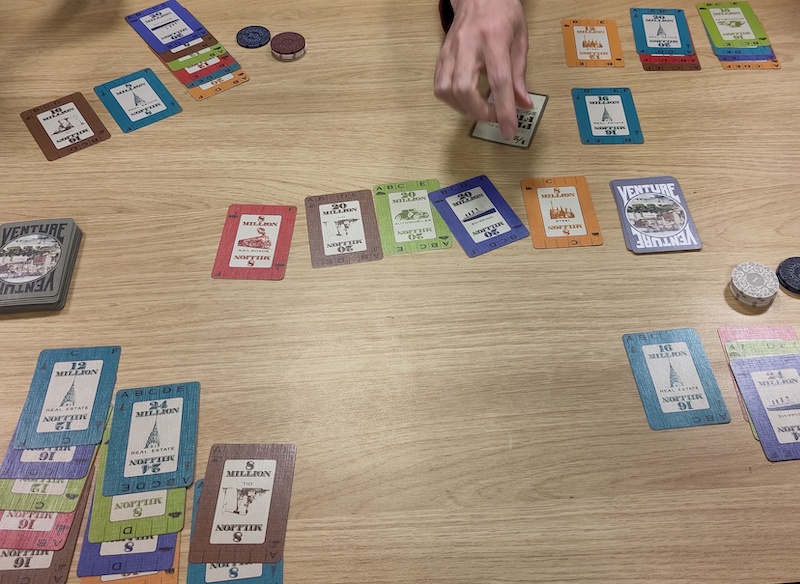
Venture is a very old game from the legendary Sid Sackson (designer of Acquire) with many reprints over the years and Simon W. mentioned that somehow nearly every reprint has managed to include an error in the rules (even though the game is rather simple). At its heart, Venture is a set collection game with in-game and end-of-game scoring based on buying up commodity company cards (Oil, Automobiles, Real Estate and 3 others) that have a certain number of letters A to F associated with it, the more it has the more expensive, the aim is to collect sets of the different companies but they must have a letter in common.
To buy the companies from the market of 6 on the table you use Venture cards that come in different denominations that pay for your actions on your turn - either buying companies, re-ordering your sets or taking over another players company from the top of one of their sets (you do need a special Venture card to do this). You then draw up 2 new Venture cards, and when a profit card is drawn everyone’s sets are scored - you need at least 3 in a set to get 1 point, and all 6 companies in a set scores 10 points. The game ends when the stack of Company cards run out and a last profit round is scored.
Its an interesting game with people vying to build their sets, whilst also stopping others keeping a set of 6 too long and accruing a large number of points during the game. This time is was a close run thing between Dave B. and Jeremy J. with Dave just taking the win by a couple of points.
The next session is the 7th of February, please join us for more games. We try and cater to all tastes from classics to new and all types of themes and gameplay mechanisms. Let us know on Discord if there are any particular games you would like to try and we will try and organise a member to bring that along.
- Total Session Attendance: 18
-
Board Games: